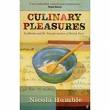 I’ve just started reading a book that aims to trace Britain’s culinary evolution through the lens of its cookbooks. It’s called Culinary Pleasures, and is by Nicola Humble. Already, having only read the introduction, I’m hooked.
I’ve just started reading a book that aims to trace Britain’s culinary evolution through the lens of its cookbooks. It’s called Culinary Pleasures, and is by Nicola Humble. Already, having only read the introduction, I’m hooked.
The other day I wrote about the introductions to Elizabeth David’s Book of Mediterranean Food. Cook books, I argued, “can offer well-written prose; evoke a time or place fondly remembered (the cook book as travelogue); and reflect the society and culture of the historical period when they were written”. In the case of David’s introductions, I pointed out how readers can discern the longing for good food caused by the effects of rationing and the war; and the excitement felt by the general public, as shops and supermarkets broadened their culinary product base.
But Humble expresses the link between cookbooks, culture, society and history for more eloquently than I did in my post. Here’s an excerpt from her introduction:
This is not primarily a history of food, many excellent examples of which already exist; it is rather a cultural history of the cook book, examining it in both its most typical and its most outlandish forms to see what it has totell us about the hopes and fears, the tastes and aspirations, the fantasies and paranoias, and the changing social roles of its particular historical moment.
Already, I’m compiling a list of cook books that sound worth seeking out, from reading Humble Pleasures. These include:
- The Constance Spry Cookery Book
- Marcel Boulestin’s The Conduct of the Kitchen
- Beeton’s Book of Household Management
- Eliza Acton’s Modern Cookery for Private Families
- Escoffier’s Guide to Modern Cookery
Filed under: food books, food history | Tagged: a book of mediterranean food, constance spry, culinary pleasures, eliza acton, Elizabeth David, Escoffier, marcel boulestin, mrs beeton, nicola humble | Leave a comment »



 Culinary aids they may ultimately be, but cook books can also can also reward readers who have no intention of attempting their recipes. They can offer well-written prose; evoke a time or place fondly remembered (the cook book as travelogue); and reflect the society and culture of the historical period when they were written.
Culinary aids they may ultimately be, but cook books can also can also reward readers who have no intention of attempting their recipes. They can offer well-written prose; evoke a time or place fondly remembered (the cook book as travelogue); and reflect the society and culture of the historical period when they were written.